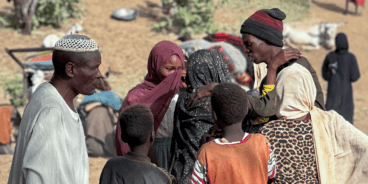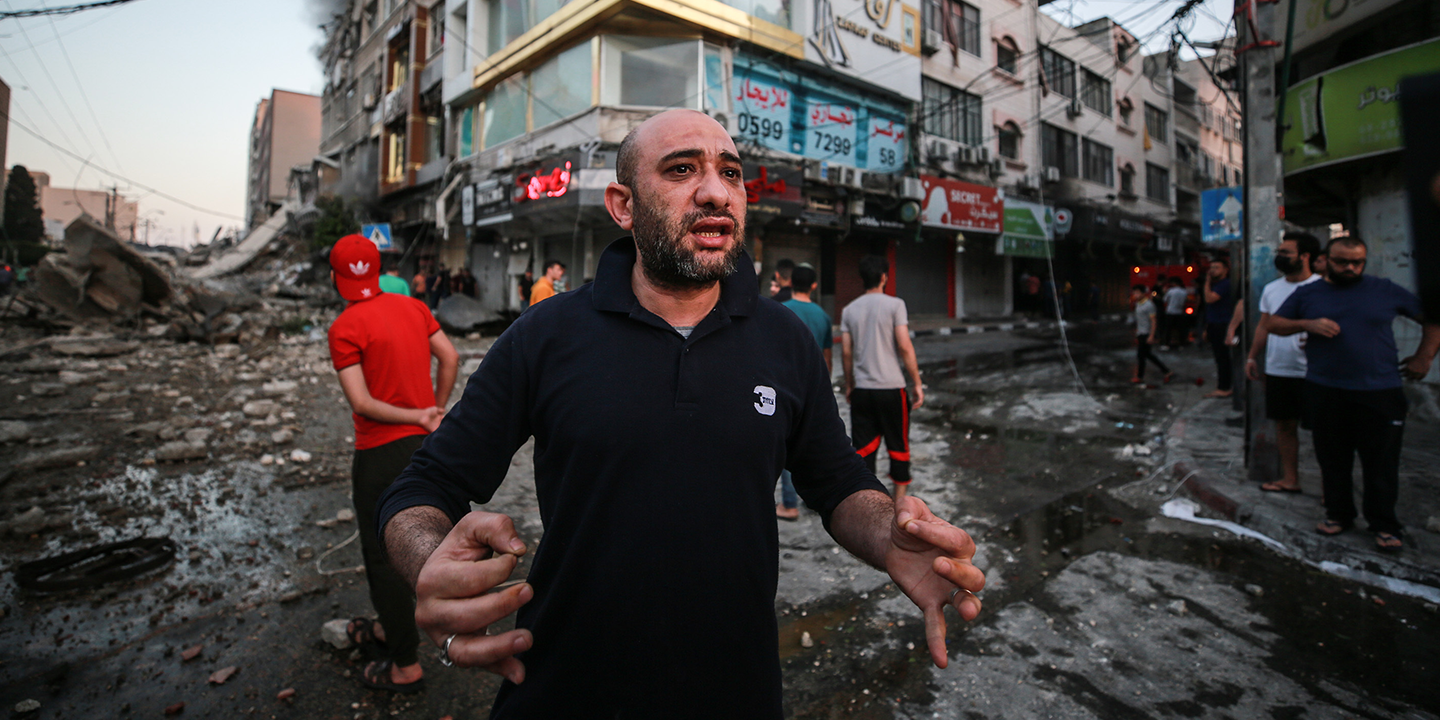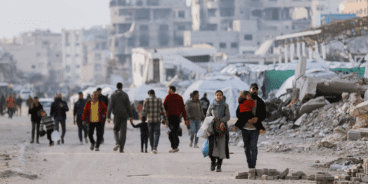

Atrocity Alert No. 253: Israel and the Occupied Palestinian Territories, Myanmar (Burma) and Colombia
Atrocity Alert is a weekly publication by the Global Centre for the Responsibility to Protect highlighting situations where populations are at risk of, or are enduring, mass atrocity crimes.
WAR CRIMES CONTINUE IN GAZA CONFLICT
As the war in the Gaza Strip has intensified over the past week, Israeli forces have displayed reckless disregard for the lives of Palestinians in the blockaded enclave, carrying out hundreds of airstrikes targeting residential buildings in one of the most densely populated areas in the world. Since 10 May at least 219 Palestinians, including 61 children, have been killed and over 1,500 injured by Israeli airstrikes. Airstrikes hit Shateh refugee camp on 15 May, killing 10 civilians, and also targeted a multi-story building that includes the media offices of Al Jazeera and the Associated Press. At least 130 buildings – including 17 hospitals and Gaza’s only laboratory for COVID-19 testing – have now been seriously damaged or destroyed, forcibly displacing over 58,000 Palestinians. Gaza’s sewerage system and water supply have also been damaged by airstrikes, with the UN reporting that 800,000 Gazans now lack access to safe drinking water. These attacks, which appear to deliberately ignore the principles of proportionality and distinction, may amount to war crimes under international law.
Meanwhile, Hamas and other Palestinian armed groups have continued to indiscriminately fire more than 3,000 rockets into Israel, killing 12 Israelis and damaging civilian property. Despite approximately 90 percent of the rockets being intercepted by Israel’s “Iron Dome” defense system, such attacks also constitute war crimes.
The ongoing conflict has also led to increased inter-communal violence inside Israel and the Occupied West Bank, where security forces have been complicit in violent attacks by Jewish settlers against Palestinian citizens of Israel. According to the UN Office for the Coordination of Humanitarian Affairs, at least 26 people have been killed, including 3 children, and over 4,800 injured in the West Bank since 10 May. Israeli Prime Minister Benjamin Netanyahu reportedly told Israeli police not to fear accountability regarding their conduct. “We hear talk of apprehension over [future] commissions of inquiry, investigations, inspections — we will give you all the tools to protect yourself and the citizens of Israel,” said Netanyahu. “You have our full backing, do not be afraid.”
Prime Minister Netanyahu also declared a state of emergency in the Israeli town of Lod, near Tel Aviv, where inter-communal violence resulted in Arab Israelis setting fire to several synagogues and Jews attacking and stoning cars driven by Arab residents. Two men have been killed in Lod since Monday.
Since 10 May the UN Security Council has been attempting to adopt a statement calling for a ceasefire between Hamas and Israel. However, the United States – which has used its veto power more than 40 times in the past to defend Israel – continues to undermine these efforts. The UN General Assembly will convene a special meeting to discuss the crisis this Thursday, 20 May.
On 18 May five UN human rights experts called on the international community to demand a ceasefire and address the underlying source of the conflict. “This most recent violence has a depressingly familiar pattern to it,” they said. “Israel and Palestinian armed groups in Gaza exchange missiles and rockets following dispossession and the denial of rights in the occupied Palestinian territory, with Israel’s far greater firepower inflicting far higher death tolls and injuries and a much larger scale of property destruction.” The International Criminal Court must now urgently investigate any potential crimes that fall within its jurisdiction.
MYANMAR’S MILITARY USES HELICOPTER GUNSHIPS AGAINST CIVILIANS IN MINDAT
Violence has escalated in Mindat, Chin State, prompting Myanmar’s security forces to declare martial law on 13 May. The military has used helicopter gunships and heavy artillery in attempts to repel civilian fighters who call themselves the Chinland Defence Force and have been resisting the reimposition of military rule. At least 7 people have been killed and the security forces have also allegedly used civilians as human shields. On Tuesday the security forces reportedly cut off the water supply to residents of Mindat.
On 15 May the United States embassy in Myanmar condemned the assault on Mindat, arguing that “the military’s use of weapons of war against civilians, including this week in Mindat, is a further demonstration of the depths the regime will sink to hold onto power.” On 17 May Myanmar’s Ambassador to the UN, Kyaw Moe Tun, raised alarm about the fighting in Mindat and the deteriorating situation in his country during the UN General Assembly debate on the Responsibility to Protect (R2P) and called on the international community “to adhere to R2P.”
According to the Assistance Association for Political Prisoners, 807 people have been killed by the security forces since the 1 February coup and at least 4,174 people are in detention. On 8 May a well-known poet and activist, Khet Thi, was detained by the security forces and died the following day, with his body showing visible signs of torture.
Nearly a month since the summit of the Association of Southeast Asian States (ASEAN), there has been no progress on implementing the regional body’s “five-point consensus” plan, including designating an official envoy. “The people of Myanmar cannot keep waiting for ASEAN, which has shown no sense of urgency,” said Nadira Kourt, Program Manager at the Global Centre for the Responsibility to Protect. “It is crucial that other international entities, including the UN General Assembly and Security Council, uphold their responsibility to protect. The Council should start by immediately imposing an arms embargo.”
WIDESPREAD PROTESTS AND POLICE VIOLENCE IN COLOMBIA
Since countrywide protests erupted in Colombia on 28 April, security forces have violently cracked down on demonstrations, killing at least 42 people. As of 14 May there have been more than 1,870 alleged cases of police violence and at least 168 disappearances, as well as allegations of sexual violence and torture. The demonstrations initially began in response to a proposed tax reform, but have since shifted to protesting against endemic poverty, inequality and police violence.
On 14 May a group of UN Special Rapporteurs and experts of the Inter-American Commission on Human Rights expressed deep concern regarding the military’s involvement in suppressing protests and urged the authorities, “to respect the right to peaceful assembly during future protests and to ensure that force is used only in compliance with the principles of precaution, necessity and proportionality.” Recent abuses have also exposed the need for structural reform of the National Police Force that fought in Colombia’s decades-long conflict with the Fuerzas Armadas Revolucionarias de Colombia (FARC) and other armed groups.
Meanwhile, since 21 March fighting between Venezuelan armed forces and a dissident FARC group has escalated in Apure State, Venezuela, along the border with Colombia. Venezuelan security forces have allegedly committed extrajudicial executions, torture and arbitrary arrests of civilians during their operations. These patterns correspond with previous findings of the UN Independent Fact-Finding Mission on Venezuela (FFM), which determined that Venezuelan state agents may have committed crimes against humanity.
Colombia must investigate all alleged human rights violations and abuses and should undertake structural reform of the national police. Colombia and Venezuela should fully re-establish official communication channels, work to de-escalate political tensions and help resolve the crisis along their shared border. The FFM should investigate potential atrocities by Venezuelan security forces in Apure State.
Related Content


Atrocity Alert No. 433: Israel and the Occupied Palestinian Territory, Myanmar (Burma) and Mali
